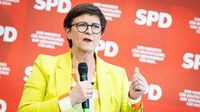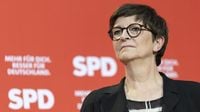In a surprising turn of events, the state executive committee of the SPD Baden-Württemberg has not nominated party leader Saskia Esken for the federal executive committee of the party. This decision, confirmed by several sources, comes as the party prepares for its leadership elections scheduled for June 2025. Instead, the committee has put forward state chairman Andreas Stoch, along with Bundestag members Katja Mast and Isabel Cademartori, as candidates for the upcoming elections.
Previously, in 2023, Esken had been nominated by her own state association, but this year, she did not present a candidacy. Stoch emphasized that the nominations made by the state committee were not a pre-decision regarding Esken's potential candidacy for re-election as party leader. "In consultation with Saskia Esken, this is not a pre-decision regarding whether she will run again as party chair or not," Stoch stated.
Despite the lack of nomination from her home association, Esken still has pathways to re-enter the federal executive committee. She could be nominated by the federal board or could choose to run spontaneously at the party convention. The party leadership election is set to be a contentious affair, with Esken's role being a topic of significant debate within the party, especially in her home state of Baden-Württemberg.
In recent days, internal discussions have become heated, particularly following comments from Sascha Binder, the state secretary of the SPD Baden-Württemberg. Binder expressed doubts about Esken's suitability for government positions, stating, "We have seven cabinet posts. I agree with Saskia Esken that four of them should go to women. But then it's a question of who are the best four? And I don't see Saskia Esken among them." This criticism has sparked backlash, with former state chair Leni Breymaier accusing Binder of making life difficult for women in the party.
Meanwhile, the CDU has been making strides in its coalition negotiations. On April 28, 2025, the CDU confirmed its approval of the coalition agreement with the SPD, a significant step towards forming a new federal government. The agreement, titled "Responsibility for Germany," was endorsed by delegates at a small party conference in Berlin. This follows the CSU's earlier approval, with the SPD's decision pending as it consults its approximately 358,000 members.
CDU leader Friedrich Merz has been vocal about his plans, indicating that he will propose Jens Spahn as the new chairman of the CDU/CSU parliamentary group in the Bundestag. Spahn, who previously served as health minister, is currently the deputy chairman of the parliamentary group and is regarded as a strong candidate for leadership.
However, Merz's selection of ministers has not been without controversy. His choices have drawn criticism from the Christian Democratic Workers' Association (CDA), with CDA leader Dennis Radtke expressing dissatisfaction over the lack of representation from the party's Christian-social roots. Radtke stated, "A government without CDA involvement is something I have only seen when the CDU was in opposition. The missing breadth in content and personnel has ultimately contributed to an election result that was far below our expectations and possibilities."
As the CDU navigates its internal challenges, it is also preparing to tackle pressing issues once the new government is formed. Merz aims to introduce a new federal budget as a priority and plans to stimulate the economy with an investment boost. He has proposed measures including asylum rejections at the borders and a two-year suspension of family reunification for refugees with limited protection status. Additionally, the new government intends to reform the controversial heating law.
In terms of ministerial appointments, reports suggest that Nina Warken, the CDU general secretary in Baden-Württemberg, is set to become the new Minister of Health, while Karsten Wildberger is expected to take on the role of Digital Minister. Other potential appointments include Johann Wadephul as Foreign Minister and Karin Prien as the head of the new Education Department.
Meanwhile, the political landscape remains dynamic, with recent polling indicating that the AfD has gained ground, now matching the CDU/CSU's approval ratings at 25%. This shift highlights the evolving sentiments among voters, especially as the SPD has seen a decline to 15%. The Greens have risen to 12%, while the Left maintains its position at 10%. The FDP and BSW continue to struggle, with both parties at risk of failing to re-enter the Bundestag.
As the SPD prepares for its leadership elections and the CDU looks to solidify its new government, the political climate in Germany remains charged with uncertainty and potential change. The decisions made in the coming weeks will significantly shape the future of both parties and their roles in the federal government.






